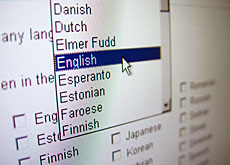Language gap threatens access to information

As English continues to flourish as the lingua franca of the internet, many experts worry that linguistic and cultural diversity is becoming lost in cyberspace.
Concern is also growing that language is playing an increasingly pivotal role in dividing the information “haves” from the “have-nots”.
“Language is the principal vector for communicating knowledge and traditions,” said Ydo Yao, a specialist at the United Nations Educational, Scientific and Cultural Organization’s (Unesco) offices in western Africa.
“And the ability to use one’s own language on information networks, like the internet, will largely determine to what extent a person can take part in the knowledge society,” he told swissinfo.
Lingua franca
According to the communications consulting group, Global Reach, around 262 million internet users – or 35.6 per cent of the world’s online population – are native English speakers.
The second largest language group on the internet are the Chinese (12.2%), followed by Japanese (9.5%), Spanish (8.0%), and German (7.0 %) speakers.
In 1999, native English speakers made up roughly 54 per cent of the online universe, indicating that other language groups are catching up.
But with almost 70 per cent of all web content in English, opinion is divided as to whether the internet will ever become a truly multilingual medium.
Clear advantage
Optimists, like Richard Watts, a linguistics professor at Bern University, do not view English as the enemy to cultural or linguistic diversity.
In fact, he argues that English-only speakers are the ones who are likely to lose out in the long run, as more and more content becomes available in other languages.
“The web offers those people who are bilingual, and who can read English, a clear advantage,” Watts told swissinfo.
“Multilingual speakers have access to web sites in their own languages and in English, whereas monolingual English speakers don’t,” he added.
Left behind
But what about the millions of people in developing nations who do not speak English and have no access to information and communication technologies (ICTs)?
Experts, like Ydo Yao, believe that while it’s important to promote the development of local content, the original language of information need not be a hindrance as long as it can be translated and adapted for remote and rural populations.
“When you give someone a tool in a language they do not understand, you are not enabling them to improve their life,” Yao explained.
“But language should not stand in the way of accessing new technologies and the only way to do this is to adapt the tools to fit the users’ needs,” he added.
He points to alphabet and language translation programmes, adapted keyboards and voice recognition systems as tools that could offer non-English speakers and illiterate populations the opportunity to fully participate in the Information Society.
“People in countries like Mali should be able to share with the world what they know,” Yao said. “So putting the emphasis on giving a voice to these people is important for them and for the outside world.”
Bridging the divide
These same concerns were echoed throughout the preparatory process for the World Summit on the Information Society, during which delegates stressed the need to “ensure multilingualism as a priority for both technology and content”.
Cultural diversity, the summit promoters argue, is the common heritage of humankind and they are keen to see the meeting’s final declaration reflect the need to foster dialogue amongst cultures and civilisations through technology.
In a world made up of over 5,000 ethnic groups – speaking just as many distinct languages – it seems that they will have their work cut out for them.
swissinfo, Anna Nelson in Geneva
Of the 680 million people online worldwide, 35.6 per cent are native English speakers.
The second largest language group on the internet are the Chinese (12.2%), followed by Japanese (9.5%), Spanish (8.0%), and German (7.0 %) speakers.
Almost 70 per cent of all web content is thought to be in English.
In contrast, around six per cent is in German, three per cent is in French and just one and a half per cent is in Italian.
One of the key topics on the agenda at the World Summit on the Information Society is the promotion of linguistic and cultural diversity in cyber space.
Some experts worry that the dominance of English as the lingua franca of the internet is threatening access to information for millions of people around the globe.
Others believe that English is destined to remain the standard language of the internet, just as it has become the common tongue of international aviation and commerce.
But summit promoters insist that the Information Society must be founded on the principles of promoting, protecting and preserving diverse languages and cultural identities.

In compliance with the JTI standards
More: SWI swissinfo.ch certified by the Journalism Trust Initiative
You can find an overview of ongoing debates with our journalists here. Please join us!
If you want to start a conversation about a topic raised in this article or want to report factual errors, email us at english@swissinfo.ch.